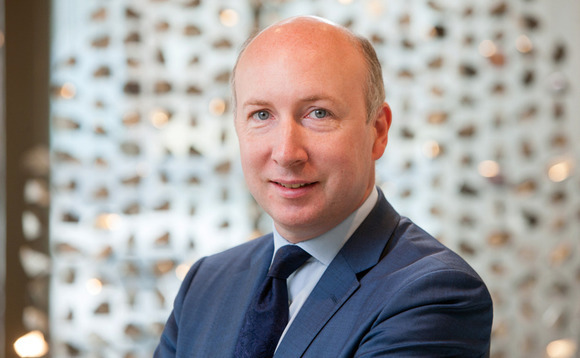
LP Profile: DWS

Formerly the asset management arm of Deutsche Bank, DWS span out in March as part of a partial listing in Frankfurt. Denise Ko Genovese talks to global head of PE, Mark McDonald, as the firm launches its private equity platform with a secondaries focus
Formerly at Credit Suisse as head of secondaries advisory, Mark McDonald joined the newly rebranded DWS in November 2017 to build a new private equity business. Previously the asset management arm of Deutsche Bank – an LP in buyout funds and funds-of-funds – DWS separated from the bank in March this year during a partial listing on the Frankfurt Stock Exchange.
Though the firm is independent, the bank still holds a majority stake in the listed asset manager. As part of the listing, Japanese insurance company Nippon Life Insurance acquired a 5% stake for roughly $375m and was the anchor investor of the partial IPO of the company, through which 20% of the business floated. Nippon's involvement reflected a broader trend of Japanese insurance firms eyeing DACH funds.
DWS currently has assets under management of €700bn, with more than €70bn of alternatives across real estate, infrastructure and private equity. It currently has a team of 12, with McDonald as global head of PE, and Daniel Green – a former chief investment officer at Green Park Capital – as head of EMEA.
We want to be holistic and creative as a true solutions partner, rather than being bound by traditional attitudes to what a 'secondary' should be" – Mark McDonald, DWS
Initially, the team will have a specialist secondaries remit – less focused on buying traditional LP stakes and instead partnering with GPs in structured fund solutions and multi-asset co-investments. The team will also continue to manage the legacy $2.3bn secondaries 'SOF' fund portfolios, with DWS acting as the regulated manager and Glendower Capital acting as the sub-adviser.
"Our strategy is a co-investment/secondaries hybrid where we can access quality assets by working with a private equity fund and injecting capital to solve a multitude of issues as a real partner," McDonald says. A typical example would be a tail-end portfolio where one company might represent 75% of the value. Traditionally, a co-investor would not be able to access that individual company without exposure to the others, while secondaries buyers would be put off by the concentration, he explains. "We want to be holistic and creative as a true solutions partner, rather than being bound by traditional attitudes to what a 'secondary' should be."
DWS is currently using its balance sheet to support the new team's strategy, but will likely also partner with third-party investors in the future.
With regard to a primary fund investment business, McDonald says there are no imminent plans, but the team is focused on building a best-in-class PE business covering various strategies over the medium term. And as for investing in first time managers, DWS would be open to maiden managers as they grow their platform: "We would be hypocrites if we weren't open to entrepreneurial teams, as we are cast in the same vein," he says. "I have a penchant for spinouts and have backed them in the past. If you get first-time managers right, you can do very well, even beat the market in terms of returns, as they are so motivated and most of the time they come with a wealth of experience."
Market view: secondaries
"The next five years will be different from the previous 10 with increased volatility in the market," says McDonald. "The dispersion of returns in between the top and bottom half of secondaries managers will begin to reflect the buyout market where not everyone does well."
Historically, people have been able to buy at a discount in a rising secondaries market, comments McDonald. But today, valuations are at near par levels and the public market run is slowing. This, he says, is leading people to take more risks to generate the same returns, hence leverage being more widely used and firms looking at more high-risk markets.
"To date, the difference between top and bottom quartile secondaries funds has been much smaller than for buyout funds, but this will surely change and people may even start losing money, especially as more and more people clamour for deals and may overstretch on risk." McDonald adds that the PE market is currently estimated at roughly $5tn worldwide, while secondaries is estimated at just over $50bn, or 1% of this total. In other asset classes, he says, secondaries markets are much larger than primaries, and McDonald sees no reason why this should not be the case in PE. "We could be at $100bn very soon," he says.
Key People
• Mark McDonald, global head of PE, is responsible for all aspects of the firm's private equity interests, including business development, investments and fundraising. He sits on the firm's executive committee for alternatives. McDonald joined DWS in 2017 from Credit Suisse, where he was global head of secondaries advisory. He has also had roles at Barclays Capital, 3i, Keyhaven Capital Partners and Pomona Capital.
• Daniel Green, head of private equity EMEA, is responsible for the activities of the business across EMEA. Prior to joining DWS, Daniel was a senior director at Meketa Investment Group, where he led EMEA investment activities across private equity and real assets. Previously, he was chief investment officer at Greenpark Capital, a UK-headquartered secondaries private equity fund manager.
Latest News
Stonehage Fleming raises USD 130m for largest fund to date, eyes 2024 programme
Sponsor acquired the public software group in July 2017 via the same-year vintage Partners Group Global Value 2017
Stonehage Fleming raises USD 130m for largest fund to date, eyes 2024 programme
Czech Republic-headquartered family office is targeting DACH and CEE region deals
Stonehage Fleming raises USD 130m for largest fund to date, eyes 2024 programme
Ex-Rocket Internet leader Bettina Curtze joins Swiss VC firm as partner and CFO
Stonehage Fleming raises USD 130m for largest fund to date, eyes 2024 programme
Estonia-registered VC could bolster LP base with fresh capital from funds-of-funds or pension funds









